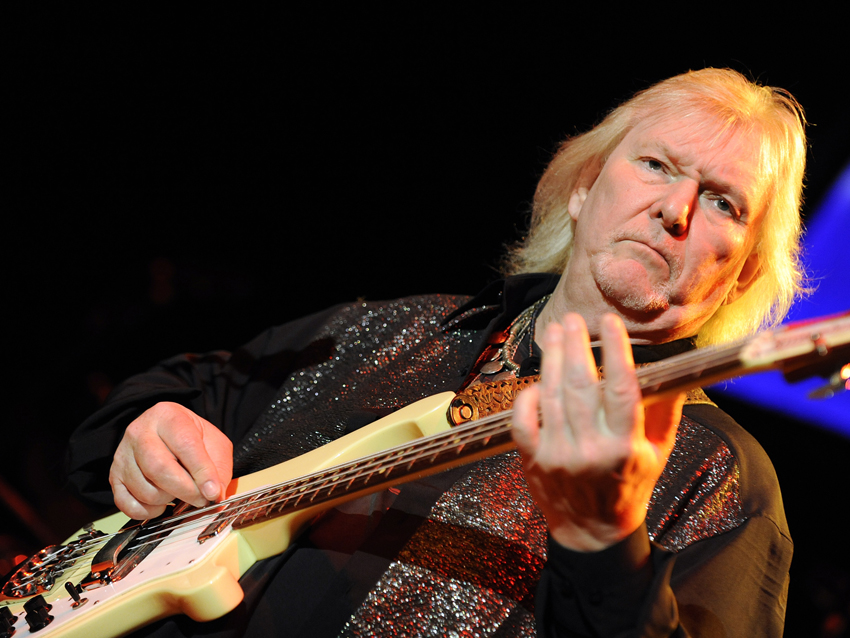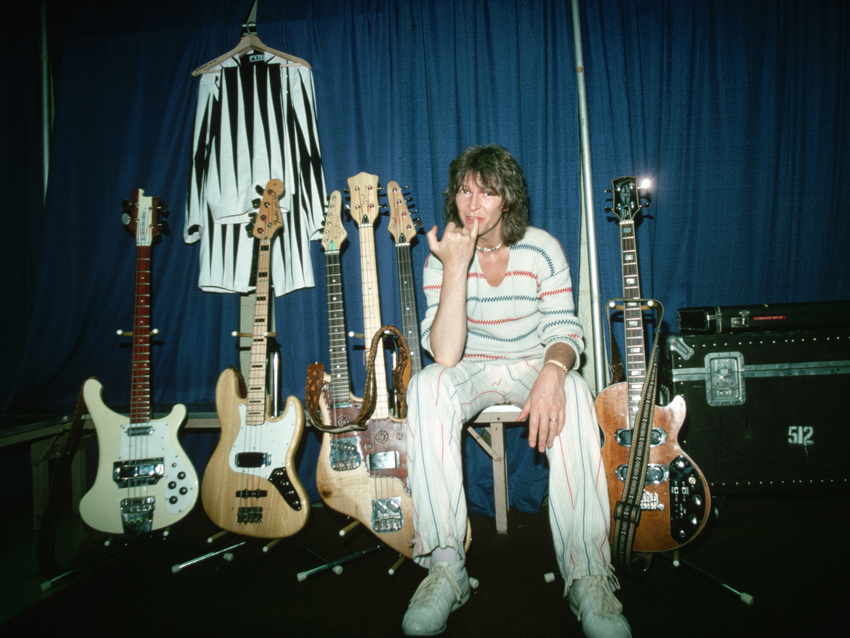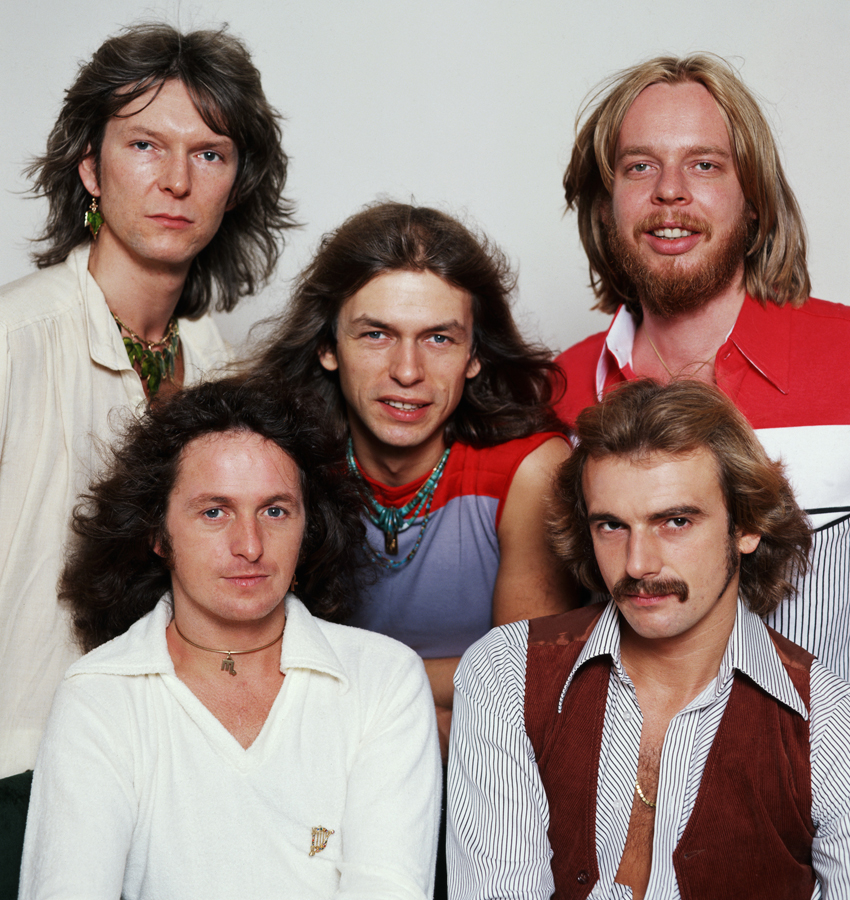
Want all the hottest music and gear news, reviews, deals, features and more, direct to your inbox? Sign up here.
You are now subscribed
Your newsletter sign-up was successful

Rickenbacker man Chris Squire on stage with Yes in Vienna, Austria, November 2011. © HERBERT P OCZERET/epa/Corbis
"Being called a 'music legend' is a very funny thing," says Yes bassist Chris Squire. "It's nice to know that my work has been appreciated and that people have given me that status. On a personal level, however, I can't think about it too much. It means a lot...but then it doesn't."
Which is another way of saying that Squire isn't letting accolades (especially those of MusicRadar readers) go to his head, nor is he resting on his laurels. In 2011, Yes released two albums, a glorious studio set, Fly From Here, helmed by longtime producer (and onetime band singer) Trevor Horn and featuring classic-lineup members Squire, guitarist Steve Howe and drummer Alan White, along with returning keyboardist Geoff Downes and 2009 singer recruit, Benoit David.
In addition, the group recently issued an elaborate live set, In The Present: Live From Lyon, also produced by Horn, which highlights the talents of Oliver Wakeman, son of legendary keyboardist Rick Wakeman, who temporarily assumed his father's spot in Yes. (Downes has since rejoined the fold.)
Recording the studio album was, in Squire's words, "a fantastic experience. In fact, Steve Howe said something that was pretty amazing: 'My God, I think we've actually made an album that everybody in the band likes!' That has never happened before. The vibe was quite good the whole time. And working with Trevor was a real pleasure."
Horn's association with Yes is a long and interesting one, and so that's where our conversation with Chris Squire begins.
Trevor Horn has worked with Yes as a producer on various occasions, but there was that brief period in 1980 and '81 when he was singing with the band.
Want all the hottest music and gear news, reviews, deals, features and more, direct to your inbox? Sign up here.
"That's right, he had done the Drama album with us. I remember there was a lot of pressure on us at the time. We had a US tour booked, which was pretty much sold out everywhere, including four nights at Madison Square Garden. But we had a change of personnel: Trevor came in for Jon [Anderson], and Geoff came in for Rick. At this point, before such a tour, we thought that our fans deserved to know who the new members of the band were, and so we made an album.
"Drama was put together quickly; there were a lot of intense, 16-hour days. Despite the pressure, it was a lot of fun, and the end result was an album I'm very proud of. I think Drama defined Yes as they had become at that point in time, and it's stood the rest of time, as well."
During the '70s, the critics were brutal to Yes. You were called things like "self-indulgent," "dinosaurs..."
[laughs] "Sure. That's right."

Squire, backstage in 1980, with a snazzy suit nearby along with drool-worthy bass choices. © Lynn Goldsmith/Corbis
And then the New Wave bands joined in on the criticism. Did that sting? Did you take it to heart? Or because you were so successful, did you not care?
"Well, at the time, Yes were doing extremely well, filling arenas and stadiums. I saw those things in the press, but I can't say they had any kind of impact on our career. [laughs] Initially, of course, the whole New Wave thing was much more of a Euro-based movement. People will point to The Ramones and a few other bands, but I don't think it was as big a deal in the US as it was in other places."
You've been a longtime Rickenbacker player. When did you come out with your signature model bass?
"The one that came out in the '90s…I can't remember when that was. It was probably towards the beginning of the '90s. One thing that's always been something of a mystery, and I've never been able to pin them down on it, is the actual number of instruments produced. There seems to be some confusion as to whether it was 900 or 1000.
"I remember John Hall, the owner and CEO of Rickenbacker, called me and said, 'I think we only made 900 of them, but I'm not quite sure.' So I said, 'Well, if you're not sure, John, then go ahead and make the other 100!'" [laughs]
The first Rick you bought in the '60s, the RM1999 model - how did you come to acquire it?
"What happened was, I had left school and took a temporary job while I tried to figure out what to do with my life - this was before I became a full-time musician, obviously. I was working in a music store in London, and this particularl place happened to be the importers for Rickenbacker guitars into England. So I started seeing these basses coming in.
"I think the first three Rickenbacker basses were imported around 1964. Pete Quaife, the bassist for The Kinks, bought one. Then John Entwistle from The Who bought one. As for the third one, I asked the manager of the store if I could get an employee discount. He said I could, and so I picked up that one. [laughs] I went on to live with that guitar and perfect my style, really."
You got your first Rickenbacker before Paul McCartney?
"I think so, yeah. If this was '64, then yes, that would be true. I don't think Paul went with his Rickenbacker until a little later."

Yes' "classic" lineup in 1980: (from left) Squire, Jon Anderson, Steve Howe, Alan White and Rick Wakeman. © Lynn Goldsmith/Corbis
So many bassists cite you as a major influence, but when you were coming up, who did you listen to? Who helped to shape your playing?
"When I was 16 years old, I had great influences. There was Paul McCartney, of course. I was greatly impressed by his playing and his ability to sing at the same time. I strove to make that my goal, to be able to do both things.
I loved Bill Wyman from The Rolling Stones. Jack Bruce, too: At this point, I started going to clubs, so I saw Jack play with The Graham Bond Organization, his band before Cream. And John Entwistle, he was a huge influence. I was at just the right age in 1965 when The Who broke out in London. I was one of those 17-year-olds who went to see them everywhere they played. When I was a teenager, they were my favorite band. I really adored The Who."
Back then, your gear options weren't what they are now. In a way, did that make things more interesting? You had to rely on your own creativity…
"It was fun, sure. In the '60s, you were limited to whatever guitar you chose to play and the amp you decided to play it through. Those were about your own options. [laughs]
"Eventually, the fuzz and the wah-wah pedals came into play, but originally, it was all about your guitar and amp. It's interesting, though, and I was thinking about this just the other day: With The Beatles, George and John played Rickenbackers, as did Paul, although at first he was playing his Hofner. But it was the combination of those instruments that made their sound.
"Later on, they got into Fenders and Gibsons and other things. But the quintessential Beatles sound came from Rickenbacker guitars and the Hofner bass. With The Who, Pete Townshend played Rickenbackers before he started playing Fenders and Les Pauls. So it was just that: the guitarists got their sound with the instruments themselves.
"You could make them sound different by using certain things, like different speaker boxes and amplifiers. And Townshend obviously started with the feedback idea and using volume. It was very much every man for himself and what you could come up with!" [laughs]
Because you favored a more trebly sound for your bass, on the early records, did you ever have frequency wars with Steve Howe?
"Strangely enough, it all seemed to work quite well. Steve was playing that big hollowbody Gibson ES-175. That was basically a jazz guitar, and it had a lot of body and low-end to it. Somehow or other, the two sounds worked well together.
"But something else you have to consider is that Bill Bruford was the drummer on the first Yes albums. He was more of a jazz player, which made me have to fulfill some of the drum role a bit more than the drums did. Bill sort of played around me. In theory, it's supposed to be the other way around. We had a unique way of playing, and so the engineer was able to combine the sounds and turn them into something that people liked."
Did you change your playing a bit when Alan White joined the band?
"It didn't change a bit, it changed completely! [laughs] Alan had come from a basic rock drumming background. As we all know, he had played on the Imagine sessions and was part of the Plastic Ono Band. So it was all very solid rock drumming, but very different from Bill's playing.
"When I first started working with Alan, it took a little while to get the chemistry; it was all a bit foreign to both of us. As time went on, we modified our styles to fit each other, and now here we are, we've played together since 1972. It's like riding a bike!" [laughs]
Do you have a general philosophy as to how you approach bass playing?
"The song is the main thing, so the melody and, to some extent, the lyrical content is important to what you come up with. There's all kinds of approaches, really. You may be doing something that has a riff, or the song might be written around the riff - there's all kinds of ways you can go about it. I can't say I'm limited to doing just one thing. When it comes to looking at the bass part, all kinds of information plays a role."
What is your relationship like with Jon Anderson? Several years ago, Yes decided to continue without him. Are there any hard feelings?
"I don't think so; there shouldn't be. We just had to move on and brought in Benoit David to come in and sing. At the time, it was looking less and less likely that Jon could do it, mainly because of his medical status. And, of course, he was reluctant to commit to long-term touring - and I understand why. So we had to make that change. I always hoped that Jon would see it as a business decision and nothing personal. That's where it stands."
What was it like playing with Oliver Wakeman? Having performed with his dad for so many years, was it a little strange?
"Oliver's a really nice guy. We spent a few years on the road together, and we get along very well. It was a little strange. [laughs] Probably 50 percent of his is exactly like his father, and then the other half is all him - he's his own man. But when it comes down to playing, he's as accomplished as Rick."
Speaking of Rick Wakeman, here's probably the most important question of all: Did you ever tease him about that whole King Arthur on ice thing he did in the '70s?
"Uh…no, not really. At the time he did that, people were going for the lavish productions, and Rick just took it one stage further - onto the ice rink! [laughs] I didn't actually see it. I assume there must be some film of it. What can I say? Those were the days."
Joe is a freelance journalist who has, over the past few decades, interviewed hundreds of guitarists for Guitar World, Guitar Player, MusicRadar and Classic Rock. He is also a former editor of Guitar World, contributing writer for Guitar Aficionado and VP of A&R for Island Records. He’s an enthusiastic guitarist, but he’s nowhere near the likes of the people he interviews. Surprisingly, his skills are more suited to the drums. If you need a drummer for your Beatles tribute band, look him up.
